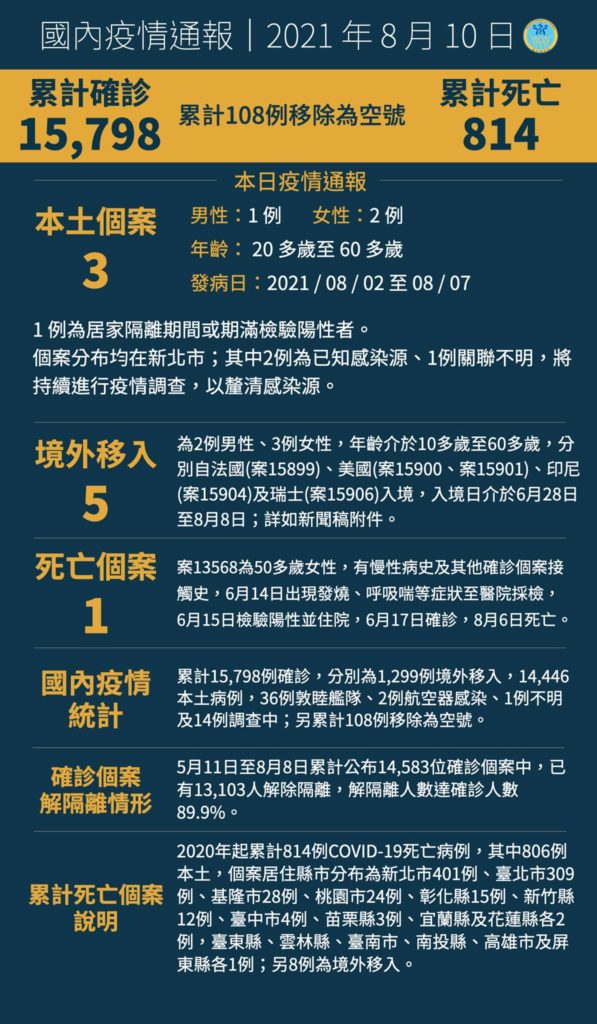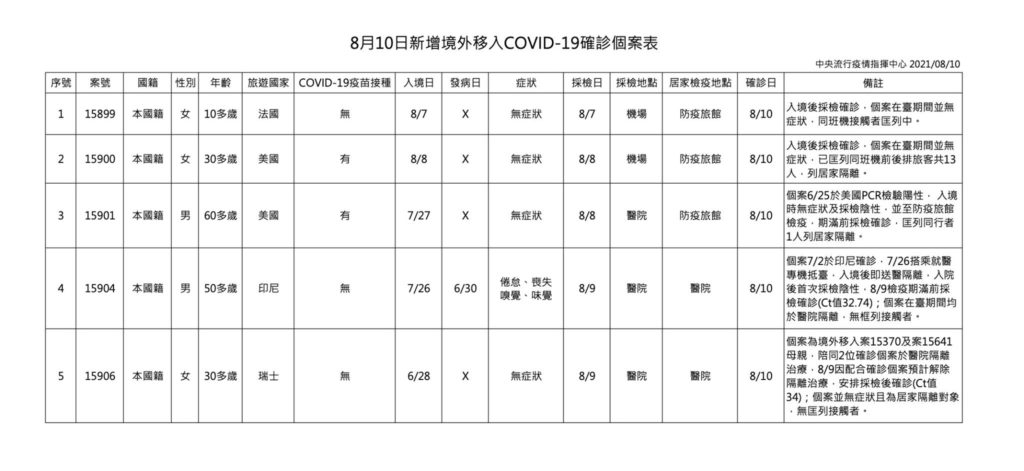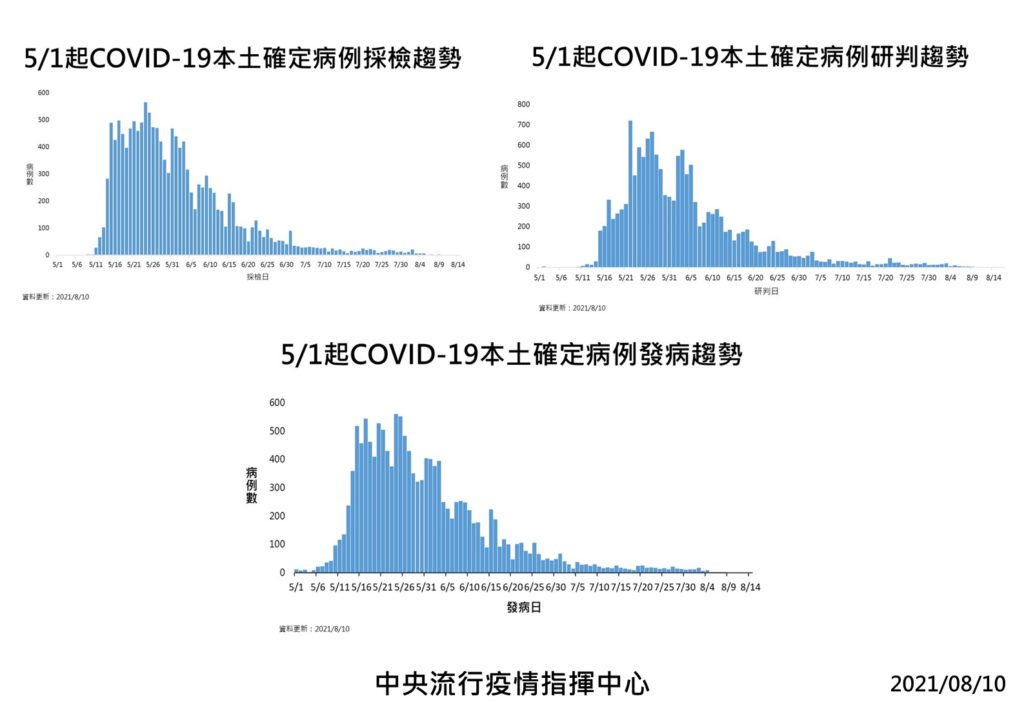by Brian Hioe
語言:
English
Photo Credit: susan curry/WikiCommons/CC
THREE DOMESTIC CASES and five imported cases were announced at the Central Epidemic Command Center’s (CECC) daily press conference today. All three cases were already in New Taipei and one case was already in quarantine. Of the two cases that were not in quarantine, the source of infection for one case is known. As a result, only one case had an unknown source of infection. 89.9% of cases to date have been released from quarantine. One death was also announced.
Three cases is the lowest number of cases since the start of the outbreak. Ministry of Health and Welfare Chen Shih-chung stated that this showed the situation was under control. Testing on Saturday and Sunday saw 3/5th of usual numbers, which is normal for weekends. The rate of infection at testing sites was 0.01%, which is very low. This suggests fewer cases in the community at present.
 Information on the new cases from today. Photo credit: Ministry of Health and Welfare/Facebook
Information on the new cases from today. Photo credit: Ministry of Health and Welfare/Facebook
Fewer vaccinations were carried out yesterday, with 30,217 vaccinations carried out. This brings vaccination coverage to 37.11%, which increases to 39.92% per 100 people.
It is harder for individuals to obtain first dose Moderna vaccines now. Individuals already vaccinated with one dose of Moderna will be able to be vaccinated with a second dose of Moderna, as the CECC is preserving vaccine stock of Moderna for second dose vaccination. Mixed dose vaccination can be carried out for medical personnel in categories one to three with one dose of AstraZeneca, with 33,000 scheduled to be vaccinated with mixed vaccines in the upcoming round of vaccination. These are individuals who were vaccinated at least ten weeks ago. 68,000 are scheduled to be vaccinated as part of category three in this round, with the CECC prioritizing targeting vulnerable groups with its limited supply of vaccination.
The CECC may adjust its measures depending on whether there is new information from research about mixed vaccinations or if it needs to increase the amount of time between first and second dose vaccination.
The CECC is aiming to vaccinate teachers before the start of school, but may expand to cover substitute teachers and other groups. It is possible that teachers will not be 100% vaccinated before the start of school. The CECC will meet with the Ministry of Education in the near future to review measures for the opening of schools.
When asked if people living together can take off masks while in cars together or in restaurants, the CECC stated that future evaluations will be made based on the circumstances, as well as difficulty implementing such measures. Moreover, when asked about a Taiwanese athlete who could not get their yellow card issued at the time of vaccination accepted as proof of vaccination for a competition, the CECC stated that the Ministry of Foreign Affairs would address this issue. Asked about an individual who was listed as vaccinated despite not having been vaccinated, this may be an accident, and they are recommended to check with the clinic listed as their vaccination site.
 Information on the imported cases from today. Photo credit: Ministry of Health and Welfare/Facebook
Information on the imported cases from today. Photo credit: Ministry of Health and Welfare/Facebook
Internet cafes are not open. Similarly, the CECC believes that libraries are sufficient and does not plan to open up study centers, concerned about the possibility of gatherings.
Two of the imported cases from today were fully vaccinated with BioNtech more than fourteen days before travel to Taiwan. As such, these can be considered breakthrough cases.
There were 74 adverse reactions to vaccination yesterday, including five deaths after AstraZeneca vaccination. There were 38 other reactions.
The government’s contract with Medigen is for the delivery of five million vaccines before the end of the year. This may be delayed if necessary for quality control inspection or other measures.
The CECC does not plan to escalate quarantine measures for inbound travelers at present, with the view that medical capacity needs to be conserved for any explosion of domestic cases.
The CECC also reviewed workers vaccinated as part of COVID-19 prevention measures, likely in response to accusations from Taipei mayor Ko Wen-je of insufficient transparency on who was vaccinated as part of categories one to three. 1,712 officials were vaccinated as part of the central government. 22,000 frontline workers, such as police or quarantine workers, were vaccinated, while 33,000 local government workers whose work is related to COVID-19 prevention measures were vaccinated. 27,000 local government officials have been vaccinated.
These are the main groups of over 10,000 individuals vaccinated as part of plans drawn up by the central government. 2,614 workers that are part of Medigen and United BioMedical were vaccinated in order to avoid disruptions to manufacture of domestic vaccines. These were workers at four manufacturing facilities and three storage facilities, a total of 2,614 workers.
The Executive Yuan has announced details of the new stimulus voucher program. This mostly follows the same format as last year’s triple stimulus vouchers and will be a paper voucher, though the voucher exchanges 1,000 NT for 5,000 NT.
 Further information released by the CECC. Photo credit: Ministry of Health and Welfare/Facebook
Further information released by the CECC. Photo credit: Ministry of Health and Welfare/Facebook
According to New Taipei mayor Hou You-yi, of the three cases in New Taipei, one case each was found in Shulin, Xinzhuang, and Yonghe. 317 tests over the weekend found one case.
Much of Hou’s comments today expressed concern regarding quarantine facilities. Hou stated that he hoped to avoid a repeat of the Novotel Hotel incident that led to the start of the present outbreak and the arrival of the Delta variant. Since July 1st, there have been four imported cases of the Delta variant and nineteen imported cases that were not Delta variant. Hou believes that 1/6th of imported cases being the Delta variant is high.
Consequently, measures for quarantine hotels must be strengthened or maintained. There are 21 quarantine hotels in New Taipei, with 2,418 rooms, which operate at 60% capacity. Hou states that quarantine hotels must be inspected, there must be disinfections of all luggage before entering, and disinfection of hotel rooms after occupants leave quarantine. If a confirmed case occupies a room, the room must be disinfected and not used for three days after they vacate the room.

